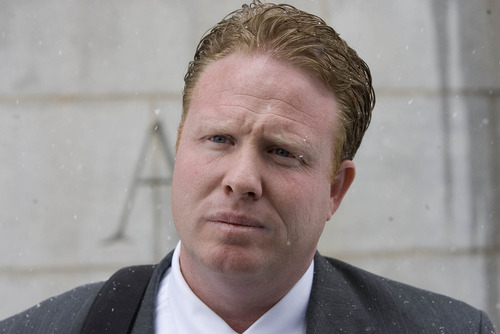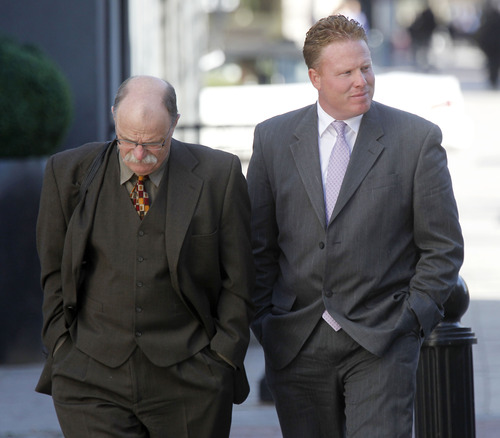This is an archived article that was published on sltrib.com in 2013, and information in the article may be outdated. It is provided only for personal research purposes and may not be reprinted.
A judge in Nevada presiding over a lawsuit against Jeremy Johnson has granted an emergency motion by federal prosecutors in Utah to temporarily halt some proceedings while they pursue criminal charges against the St. George businessman and four cohorts in his online marketing company.
Meanwhile, attorneys submitted competing proposals for a permanent gag order in the Utah prosecution.
U.S. District Judge Miranda M. Du temporarily stopped Johnson and others from pursing evidence in the civil lawsuit in Las Vegas and set a hearing for next month to consider a ban on such activity that would last until the criminal case in Utah concludes.
The government's motion is a result of a snarl of potential witnesses at the intersection of the two cases — both of which concern Johnson's operation of his I Works company.
Johnson, who represents himself in the Las Vegas case filed by the Federal Trade Commission, and attorneys for other defendants had been interviewing or seeking to interview witnesses in that case. But some of those same witness, prosecutors have said, also could be important to the criminal matter in Salt Lake City.
"The proposed stay is necessary to prevent these defendants from using the civil discovery process to obtain information to which they are not entitled in the criminal case," federal prosecutor Jeannette Swent wrote to Du.
The judge set a hearing for May 16 to consider whether the ban would be extended until the criminal case wraps up.
Johnson said he could not comment because he is under a court order not to discuss the criminal case — at least until the court approves a permanent "gag order."
"I'd love to comment but I am gagged," Johnson wrote in a text message. "No First Amendment for me."
U.S. Magistrate Judge Paul Warner, a former U.S. attorney for Utah, had warned Johnson and attorneys not to talk about his case as a result of Johnson's public relations war in social media, across the Internet and during interviews in which he denied the criminal charges against him, accused federal prosecutors of misconduct and labeled the allegations in the lawsuit as false.
On Monday, prosecutors and defense attorneys filed separate proposed gag orders, which prosecutors had requested as a result of Johnson's media offensive. Warner had indicated he would sign such an order but had asked both sides to try to reach an agreement on the wording.
The separate proposals show, however, that no such accord was reached. Johnson's lawyers, apparently acting on behalf of at least some of the other three defense attorneys, want a stronger prohibition on statements from prosecutors.
They propose that in addition to attorneys, "agents" acting for them also be part of the gag order. The two sides also differ on whether it would be OK to disseminate information "regarding the general scope of the investigation or prosecution." Federal prosecutors want to permit that type of communication, while defense attorneys want to ban it.
Both sides either declined to comment on the proposed gag orders or did not return calls or emails.
Johnson represents himself in the Nevada case because the FTC obtained a court order after filing the lawsuit in December 2010 that required a receiver to seize the assets of Johnson, I Works and related companies and other top company officials.
The suit alleges Johnson and others bilked consumers out of millions by failing to adequately disclose monthly charges when they marketed "free" products for such things as obtaining government grants for personal expenses or making hundreds of dollars a month through Google AdWords.
When MasterCard and Visa began to cut off I Works' credit and debit-card processing accounts, Johnson and others allegedly formed shell companies to continue charging consumers, the lawsuit alleges.
The alleged creation of these companies is at the heart of the criminal charges against Johnson and the four other former I Works employees. An indictment handed up last month contained 86 charges revolving around bank fraud and setting up new processing accounts with allegedly false information.
Johnson and the others have pleaded not guilty. No trial dates have been set for either the civil lawsuit or the criminal case.
Johnson also is embroiled in an alleged political corruption case involving Utah Attorney General John Swallow. Johnson has alleged that Swallow, when he was chief deputy attorney general, helped broker payoffs to enlist the aid of Senate Majority Leader Harry Reid, D-Nev., in derailing the FTC probe of I Works.
Swallow and Reid have vehemently denied the allegations.
The U.S. attorney's office is investigating Johnson's allegations and others involving Swallow.
Twitter: @TomHarveySltrib





